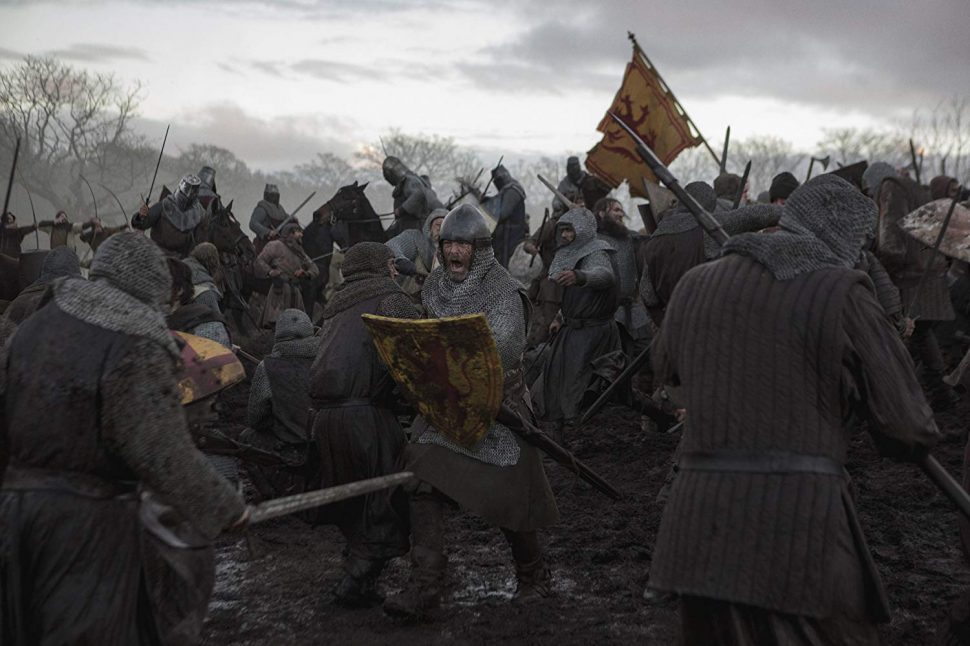
“Outlaw King” tells the story of Robert the Bruce, the 14th century Scottish lord who would launch a crazy war against the English army to give credence to the Scottish crown. The Scottish fight for respect from England, despite its temporal distance, felt relevant and timely. And, the toxic relationship between Scotland and England in the film presented it as a strange kind of partner for a very different TIFF premiere, the small-budget independent Irish drama “Float Like A Butterfly.” Directed by Carmel Winters, “Float Like A Butterfly” is the story of Frances, a young Irish Traveller (an Irish ethnic group known for their nomadic ways) who yearns to be a boxer (the title is an ode to her idol, Muhammad Ali), despite a chaotic home life.
“Outlaw King” and “Float Like a Butterfly” are different, formally and narratively. And on, the surface they seem to have little in common beyond being set in countries bordering England but it is that same shared English border that provides them both with a timely socio-political relevance. Both films hinge on the question of identity, a concept that is illusory but essential for nations living under the threat of the Englishness that threatens the culture of Scotland in the 14th century and Ireland in the 1960s. Both protagonists (the taciturn Robert the Bruce, and the similarly blunt Frances) are struggling to define themselves amidst the weight of their respective family’s expectations.
“Butterfly” is a thoughtful assessment of gender relations as Frances struggles to be recognised by her volatile father, who is struggling with his own personal demons. Her desire for boxing and her androgynous behaviour present her as even more of an Other, in a world where itinerant Irish Travellers are already an object of scorn for the dominant population. Whereas Frances is wondering how to be a woman, “Outlaw King” is superb in the way it asks how to be a man. Many films this year have mined the complexities of male relationships for content, and “Outlaw King” is one of the better ones. Mackenzie’s script and direction examine the limits and scope of what it means to be a man and the ways the burden of masculinity intersects and clashes across country, across class, and across family boundaries.
“Are you a good man, Robert Bruce?” Aaron Taylor-Johnson’s James Douglas asks Robert the Bruce. Everything is circling around that question in the film. The film has many men, and the idea of goodness sometimes seems incorrect for them all. “I’m trying to be,” Robert answers. “That’s good enough for me,” is Douglas’ short response. It’s a larger point the film is making. The only way to be a good man, a good human, is to make an effort.
Taylor-Johnson is the standout in “Outlaw King,” giving the film’s most visceral and most unpredictable performance. Douglas bears the trauma of his history on his face and in his voice—a Scottish man burned by the legacy and land stolen by the English. The best shot in the film, beautiful in its lack of subtlety, is one of Douglas’ face covered in blood as he screams out his own name. Douglas best emphasises the pseudo-postcolonial undertones of “Outlaw King” and Scotland’s struggle for respect. The term post-colonialism cannot quite stretch to accommodate the issues of imperialism that countries like Scotland (and Ireland) have experienced and yet both films are very much about subcultures trying to fight, sometimes literally, against dominant ones. “Outlaw King” and its tale of war is very much a story of a war against an imperial power. In the film’s final battle, Robert urges his men to “use the land to [your] advantage.” Imperialism has always been about the land, and Mackenzie’s camera is fascinated by landscape. The land is a warm embrace, or a soothing balm, or a private hideout. It’s that same closeness to the land that defines the Irish Traveller and sees Frances going on a road trip with her father and brother. The land becomes your identity.
“Outlaw King” and “Float Like A Butterfly” are doing different things. One is a muddy war epic and the other is a prickly coming of age story but it is significant that they both end with bitter, bloody fights, as both protagonists face off against ostentatious English boys who are trying to escape the shadows of their fathers. The idea of history and identity looms large everywhere. Even though both films are looking backward they feel vivid and essential in the face of current discussions of Britishness and Englishness. Brexit and its effects loom over everything in the UK and its tentacles move beyond the United Kingdom and Europe and reach other parts of world that were formerly part of the British empire. In this way, the quest for identity feels universal.
“Outlaw King” and its discursiveness feels necessary and apt. Chris Pine’s silent Robert and Taylor-Johnson’s manic Douglas show two sides of trauma. Although it was felled by a festival reception, I hope there’s a warmer and better future for the film as folks seek it out on Netflix.
I don’t know when the very good, and very rewarding, “Float Like A Butterfly” will make its way to Guyana. It picked up the FIPRESCI (The International Federation of Film Critics) award at TIFF, so it’s likely we can expect it to turn up for DVD or streaming in the new year.
Both films ask tough questions about identity and the vestiges of responsibility forced onto a subculture by a dominant one, and the questions feel relevant beyond Scotland and Ireland. The struggle for national identity for countries that have experienced trauma, and for persons who have experienced trauma, does not ever end in satisfying way. So the ending of both films feel elliptical. The battle has ended but the stories remain unresolved. The quest for home and identity is continuous.

